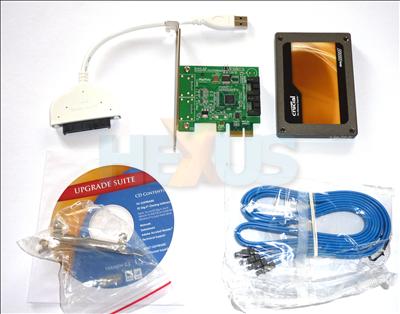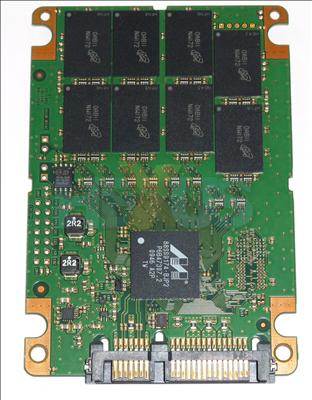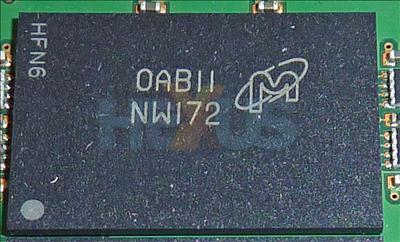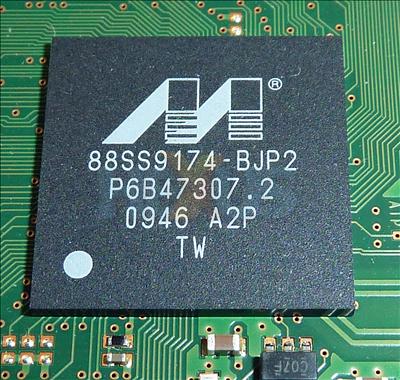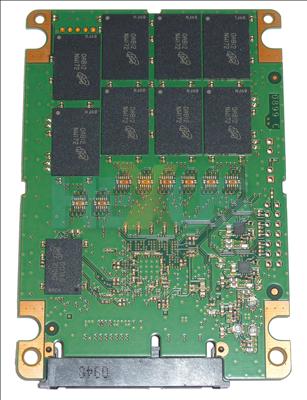The 350MB/s speed demon
Here's how the two RealSSDs stack up.| Crucial RealSSD C300 | 128GB | 256GB |
|---|---|---|
| Read speed (up to) | 355MB/s | 355MB/s |
| Write speed (up to) | 140MB/s |
215MB/s |
| Controller | Marvell | Marvell |
| Buffer chip | Micron | Micron |
| Buffer size | 256MB | 256MB |
| TRIM support | Yes | Yes |
| Etail price (14/04/10) | £351 |
£547 |
| £ per GB | 2.74 |
2.14 |
The two SSDs are differentiated by more than just capacity. The 128GB model has a matching 355MB/s sustained read speed but is compromised with respect to sequential writes, coming in at 140MB/s. The smaller-capacity drive uses fewer chips, most likely, and may well be artificially limited to help in market segmentation.
One would expect the price of the 256GB drive to be near-double that of 128GB's, but a £-to-GB ratio of 2.14 is in keeping with other premium SSDs. £547 is still heck of a lot of money to spend on a single solid-state drive, of course, but we don't see that figure coming down a great deal until 25nm NAND production is ramped up.
The full-retail drive ships with a SATA-to-USB cable, SATA cables, and a utility CD with EZ Gig II Cloning software, manuals and datasheets. To make reviewers' lives easier, Crucial bundles in a Highpoint RocketRAID 620 SATA controller that provides both SATA 6Gbps (revision 3.0) and RAID 0,1, 5, 10, JBOD support, but bear in mind that Crucial is not bundling the card with retail models.
Based on the PCIe Gen 2 protocol with a x1 interface, the card has a theoretical 500MB/s of bandwidth in each direction, ensuring that the Crucial C300 isn't stifled by the limitations imposed by omnipotent SATA 3Gb/s, where the bandwidth ceiling is a usable 270MB/s or so - well under the drive's purported read speed.
Premium motherboards in 2010 are now shipping with integrated support for SATA 6Gb/s and USB 3.0 - ASUS, MSI, and Gigabyte leading the way - but the majority of installed boards still feature the slower standard.
Here's the 256GB RealSSD C300. Equipped with TRIM support to help keep performance at near-new levels at all times, it, like most SSDs, has user-upgradeable firmware. Crucial backs it up with a three-year warranty.
Open the casing - voiding your warranty, by the way - and all the money's in the single PCB. The 256GB drive is outfitted with 16 NAND chips from parent company Micron.
Eight are lined on each side of the PCB. Each chip uses Micron's 34nm MT29F128G08CKCBBH2-12 NAND memory and is 128Gbit in size, resulting in an SSD-wide capacity of 256GB.
Micron goes against the established grain and opts for the Marvell 88SS9174-BJP2 controller that can provide considerable throughput if paired up with the correct memory.
The other side shows the remaining eight chips and the 256MB chip (OAD12) that acts as a buffer between the NAND and controller.
Enough jibber-jabber from us, how about we serve up some results?






